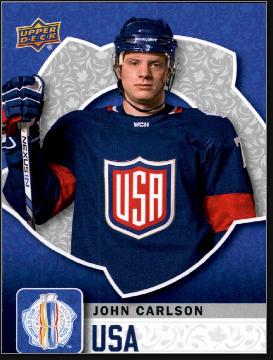
Sport: Hockey
Born: January 10, 1990
Town: Colonia, New Jersey
John Carlson was born January 10, 1990 in Natick, Massachusetts and grew up in Colonia, J. John’s father, Richard, was a standout in junior hockey in Massachusetts and played in college. John and his older brother, Andrew, were supremely talented players. They came up through the Jersey Rockets program and idolized defenseman Scott Stevens of the Devils. The family made many a trip to the Meadowlands to watch NHL games.
The Carlson brothers were standouts for St. Joseph High School in Metuchen, helping the Falcons make the 2005 state playoffs in John’s freshman season. Often, they faced their Rockets teammates in high-school games. Ironically, the brothers rarely shared the ice. The team used them as a one-two punch on different shifts. Both were excellent defensive players; John possessed the finer offensive skills, including a wicked slap shot.
John left St. Joseph as a sophomore, while Andrew headed to Northeastern to play college hockey. Under Rockets coach Bob Thornton, John’s game continued to develop. At 17, John played for the Indiana Ice of the US Hockey League—the nation’s only Tier I junior circuit—and was among the league leaders in scoring.
By the time John was 18, he stood 6’2” and was ranked among the top puck-carrying defensemen and shot-blockers in junior hockey. Plans to play for UMass began to change when NHL scouts started discussing John as a potential first-round pick.
The Washington Capitals grabbed John with the 27th selection in the opening round of the 2008 NHL Draft. They had two picks in the opening round; the Caps grabbed Anton Gustaffson with the 21st pick. John played a season in the minors for the OHL London Knights, tallying 76 points in 59 games. In 2009–10, he joined the Hershey Bears in what would be his final stepping stone to the NHL. That January, John was an alternate captain at the World Junior Championships. In the final against Canada, with the score knotted 5–5 in overtime, John scored his second goal of the game to give Team USA the gold medal. In all he notched 7 points in 7 games during the tournament.
John was promoted to the Caps and saw action in 22 games at the tail end of the 2009–10 campaign. He played all 82 games the following year, and finished fifth in the 2011 Calder Award voting. He also was member of the league’s All-Rookie Team.
In 2012–13, John had some of the best penalty-killing numbers in the league. His breakthrough year came as an offensive force came in 2014–15, when he was widely recognized as one of the elite defensemen in the Metropolitan Division. He ranked third on the club behind Alex Ovechkin and Niklas Backstrom in scoring with 12 goals and 43 assists, and was picked to play in his first All-Star Game.
With John anchoring the back line, the Caps fashioned a winning record year in and year out. In 2015–16 and 2016–17, Washington had the best record in the league. However, the team constantly fell short in the playoffs, failing to advance to the Conference Finals. In four of John’s first six seasons, they lost to the Rangers.
The 2017–18 campaign turned to to be John’s best. He led all NHL blue liners with 68 point and was a key man in the Caps’ run to the Stanley Cup Finals. John accumulated 20 points in 24 games as Washington won tough series against the Blue Jackets, Penguins and Lightning. The Capitals faced elimination in the conference semis against Tampa Bay, but erased a 2–3 deficit with back-to-back shutouts by goalie Braden Holtby. The Finals featured a showdown with the Cinderella Las Vegas Knights. Any thoughts of an easy win were erased in the opener, which the Knights won, 6–2. Washington rebounded to sweep the final four games.
John was rewarded for his great season with a contract extension and he rewarded the club with three 70-point seasons in the next four years. He was an All-Star fro the first time in 2018 and scored his 100th career goal in 2019. In 2020, he was named a finalist for the Norris Trophy. The Caps made the playoffs in the four years after their Cup win, but made earlier exits each spring.